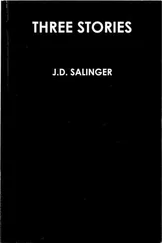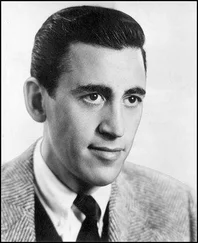J. Salinger - Nine Stories
Здесь есть возможность читать онлайн «J. Salinger - Nine Stories» весь текст электронной книги совершенно бесплатно (целиком полную версию без сокращений). В некоторых случаях можно слушать аудио, скачать через торрент в формате fb2 и присутствует краткое содержание. Жанр: Старинная литература, на английском языке. Описание произведения, (предисловие) а так же отзывы посетителей доступны на портале библиотеки ЛибКат.
- Название:Nine Stories
- Автор:
- Жанр:
- Год:неизвестен
- ISBN:нет данных
- Рейтинг книги:3 / 5. Голосов: 2
-
Избранное:Добавить в избранное
- Отзывы:
-
Ваша оценка:
- 60
- 1
- 2
- 3
- 4
- 5
Nine Stories: краткое содержание, описание и аннотация
Предлагаем к чтению аннотацию, описание, краткое содержание или предисловие (зависит от того, что написал сам автор книги «Nine Stories»). Если вы не нашли необходимую информацию о книге — напишите в комментариях, мы постараемся отыскать её.
Nine Stories — читать онлайн бесплатно полную книгу (весь текст) целиком
Ниже представлен текст книги, разбитый по страницам. Система сохранения места последней прочитанной страницы, позволяет с удобством читать онлайн бесплатно книгу «Nine Stories», без необходимости каждый раз заново искать на чём Вы остановились. Поставьте закладку, и сможете в любой момент перейти на страницу, на которой закончили чтение.
Интервал:
Закладка:
The training course lasted three weeks, ending on a Saturday, a very rainy one. At seven that last night, our whole group was scheduled to entrain for London, where, as rumor had it, we were to be assigned to infantry and airborne divisions mustered for the D Day landings. By three in the afternoon, I'd packed all my belongings into my barrack bag, including a canvas gas-mask container full of books I'd brought over from the Other Side. (The gas mask itself I'd slipped through a porthole of the Mauretania some weeks earlier, fully aware that if the enemy ever did use gas I'd never get the damn thing on in time.) I remember standing at an end window of our Quonset but for a very long time, looking out at the slanting, dreary rain, my trigger finger itching imperceptibly, if at all. I could hear behind my back the uncomradely scratching of many fountain pens on many sheets of V-mail paper. Abruptly, with nothing special in mind, I came away from the window and put on my raincoat, cashmere muffler, galoshes, woollen gloves, and overseas cap (the last of which, I'm still told, I wore at an angle all my own--slightly down over both ears). Then, after synchronizing my wristwatch with the clock in the latrine, I walked down the long, wet cobblestone hill into town. I ignored the flashes of lightning all around me. They either had your number on them or they didn't.
In the center of town, which was probably the wettest part of town, I stopped in front of a church to read the bulletin board, mostly because the featured numerals, white on black, had caught my attention but partly because, after three years in the Army, I'd become addicted to reading bulletin boards. At three-fifteen, the board stated, there would be children's-choir practice. I looked at my wristwatch, then back at the board. A sheet of paper was tacked up, listing the names of the children expected to attend practice. I stood in the rain and read all the names, then entered the church.
A dozen or so adults were among the pews, several of them bearing pairs of small-size rubbers, soles up, in their laps. I passed along and sat down in the front row. On the rostrum, seated in three compact rows of auditorium chairs, were about twenty children, mostly girls, ranging in age from about seven to thirteen. At the moment, their choir coach, an enormous woman in tweeds, was advising them to open their mouths wider when they sang. Had anyone, she asked, ever heard of a little dickeybird that dared to sing his charming song without first opening his little beak wide, wide, wide? Apparently nobody ever had. She was given a steady, opaque look. She went on to say that she wanted all her children to absorb the meaning of the words they sang, not just mouth them, like silly-billy parrots. She then blew a note on her pitch-pipe, and the children, like so many underage weightlifters, raised their hymnbooks.
They sang without instrumental accompaniment--or, more accurately in their case, without any interference. Their voices were melodious and unsentimental, almost to the point where a somewhat more denominational man than myself might, without straining, have experienced levitation. A couple of the very youngest children dragged the tempo a trifle, but in a way that only the composer's mother could have found fault with. I had never heard the hymn, but I kept hoping it was one with a dozen or more verses. Listening, I scanned all the children's faces but watched one in particular, that of the child nearest me, on the end seat in the first row. She was about thirteen, with straight ash-blond hair of ear-lobe length, an exquisite forehead, and blase eyes that, I thought, might very possibly have counted the house. Her voice was distinctly separate from the other children's voices, and not just because she was seated nearest me. It had the best upper register, the sweetest-sounding, the surest, and it automatically led the way. The young lady, however, seemed slightly bored with her own singing ability, or perhaps just with the time and place; twice, between verses, I saw her yawn. It was a ladylike yawn, a closed-mouth yawn, but you couldn't miss it; her nostril wings gave her away.
The instant the hymn ended, the choir coach began to give her lengthy opinion of people who can't keep their feet still and their lips sealed tight during the minister's sermon. I gathered that the singing part of the rehearsal was over, and before the coach's dissonant speaking voice could entirely break the spell the children's singing had cast, I got up and left the church.
It was raining even harder. I walked down the street and looked through the window of the Red Cross recreation room, but soldiers were standing two and three deep at the coffee counter, and, even through the glass, I could hear ping-pong balls bouncing in another room. I crossed the street and entered a civilian tearoom, which was empty except for a middle-aged waitress, who looked as if she would have preferred a customer with a dry raincoat. I used a coat tree as delicately as possible, and then sat down at a table and ordered tea and cinnamon toast. It was the first time all day that I'd spoken to anyone. I then looked through all my pockets, including my raincoat, and finally found a couple of stale letters to reread, one from my wife, telling me how the service at Schrafft's Eighty-eighth Street had fallen off, and one from my mother-in-law, asking me to please send her some cashmere yarn first chance I got away from "camp."
While I was still on my first cup of tea, the young lady I had been watching and listening to in the choir came into the tearoom. Her hair was soaking wet, and the rims of both ears were showing. She was with a very small boy, unmistakably her brother, whose cap she removed by lifting it off his head with two fingers, as if it were a laboratory specimen. Bringing up the rear was an efficient-looking woman in a limp felt hat--presumably their governess. The choir member, taking off her coat as she walked across the floor, made the table selection--a good one, from my point of view, as it was just eight or ten feet directly in front of me. She and the governess sat down. The small boy, who was about five, wasn't ready to sit down yet. He slid out of and discarded his reefer; then, with the deadpan expression of a born heller, he methodically went about annoying his governess by pushing in and pulling out his chair several times, watching her face. The governess, keeping her voice down, gave him two or three orders to sit down and, in effect, stop the monkey business, but it was only when his sister spoke to him that he came around and applied the small of his back to his chair seat.
He immediately picked up his napkin and put it on his head. His sister removed it, opened it, and spread it out on his lap.
About the time their tea was brought, the choir member caught me staring over at her party. She stared back at me, with those house-counting eyes of hers, then, abruptly, gave me a small, qualified smile.
It was oddly radiant, as certain small, qualified smiles sometimes are.
I smiled back, much less radiantly, keeping my upper lip down over a coal-black G.I. temporary filling showing between two of my front teeth.
The next thing I knew, the young lady was standing, with enviable poise, beside my table. She was wearing a tartan dress--a Campbell tartan, I believe. It seemed to me to be a wonderful dress for a very young girl to be wearing on a rainy, rainy day. "I thought Americans despised tea," she said.
It wasn't the observation of a smart aleck but that of a truth-lover or a statistics-lover. I replied that some of us never drank anything but tea. I asked her if she'd care to join me.
"Thank you," she said. "Perhaps for just a fraction of a moment."
I got up and drew a chair for her, the one opposite me, and she sat down on the forward quarter of it, keeping her spine easily and beautifully straight. I went back--almost hurried back--to my own chair, more than willing to hold up my end of a conversation. When I was seated, I couldn't think of anything to say, though. I smiled again, still keeping my coal-black filling under concealment. I remarked that it was certainly a terrible day out.
Читать дальшеИнтервал:
Закладка:
Похожие книги на «Nine Stories»
Представляем Вашему вниманию похожие книги на «Nine Stories» списком для выбора. Мы отобрали схожую по названию и смыслу литературу в надежде предоставить читателям больше вариантов отыскать новые, интересные, ещё непрочитанные произведения.
Обсуждение, отзывы о книге «Nine Stories» и просто собственные мнения читателей. Оставьте ваши комментарии, напишите, что Вы думаете о произведении, его смысле или главных героях. Укажите что конкретно понравилось, а что нет, и почему Вы так считаете.










